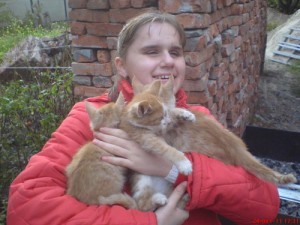Archive for January, 2013
Bulgaria, the nuclear row.
30 Jan 2013 Former Energy Minister Traycho Traykov has defined the January 27 referendum on the development of nuclear energy in Bulgaria as a “damaged item in democratic packaging.”
“The question was actually do you agree to buy it and throw it out or buy it and then eat it,” Traykov stated in an interview for Nova TV.
He said that it was highly doubtful whether the referendum had brought profits for anybody. 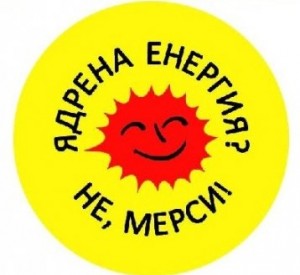
Bulgaria’s former Energy Minister suggested that there were several ways to interpret the results of the referendum.
“Of those who voted “no”, some voted against the Belene NPP, others against nuclear energy in general, still others against Belene NPP but for a seventh unit at the Kozloduy NPP, others against Belene NPP and against 7th unit, but for an extension of the lives of units 5 and 6, so there is a huge risk that you voted for one thing, while your answer is interpreted another way,” he explained.
He claimed that the referendum would still have resulted in nothing even if the question had been stated clearly.
“People told politicians that they are mature enough to understand when they are being sold a fake item,” Traykov pointed out.
Bulgaria’s former Energy Minister said that he had abstained from voting at the referendum.
According to preliminary results of the January 27 referendum on the development of nuclear energy in Bulgaria, a total of 60.55% voted in favor of the construction of a new nuclear power plant in the country.
With 97.14% of the votes counted, it emerged that a total of 832 742 people had backed the potential construction of a new nuclear power plant, while 522 927 had voted against.
The referendum was invalidated by low turnout, as merely 21% of the eligible voters cast ballots.
As the turnout is over 20%, and more than half of the votes are positive, the question is to be returned to Parliament for further discussion.
The government says it supports the provision of nuclear power from an existing plant at Kozloduy, but that it does not have the 10bn euros (£6.3bn; $13.4bn) it says would be needed to build a new plant.
Bulgaria had to close four of its old reactors at Kozloduy as a precondition for its 2007 EU membership.
The government froze plans to finish the plant at Belene last year, when work at the site on the southern bank of the River Danube was already well under way.
The Socialists are seen as closely linked to the Belene project, having granted a construction contract for the plant to Russian state company Atomstroyexport in 2008. They say Belene would now cost 4-6bn euros to complete, and would lower electricity costs for consumers.
Source: Sofia News Agency, BBC.
Early elections should be held as soon as possible in the Czech Republic, president-elect Miloš Zeman told Czech Television. Zeman said the center-right government is reliant on LIDEM, an offshoot of the Public Affairs (VV) Party which was never elected. PM Petr Nečas responded that the government is responsible to Parliament, not the president, and will continue as long as it holds a majority in the lower house. Zeman, a leftist candidate, won the Czech presidential elections with 54.8 percent Jan. 26, receiving half a million votes more than his conservative rival Karel Schwarzenberg. The voter turnout was 59.11 percent. 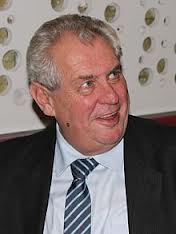
Czech subsidy recipients drawing from European Union funds have so far received 407.9 billion Kč for the program period 2007-2013, which is equal to 52 percent of the total amount the Czech Republic can draw in this timeframe, the Local Development Ministry announced today. In the last quarter of 2012, successful subsidy recipients received 38.5 billion Kč worth of European subsidies. Of the total amount of subsidies paid out to recipients by the Czech Republic, the Czech Finance Ministry has asked the European Commission (EC) for the payment of 233.9 billion Kč, or 29.8 percent of the total allocated amount.
The German government should not invite Zeman to Berlin due to his anti-German campaign, daily Die Welt claimed in an editorial. Zeman’s comments regarding the 1945 deportation of some 2 million Sudeten Germans from Czechoslovakia points to a language of hate that should not be tolerated in European politics, the daily wrote. Another German newspaper, Südwest Presse, referred to the president-elect as a “leftist dinosaur” who sowed fear in the minds of “little people” to get himself elected. “The Sudeten German topic is unlikely to have any political relevance for Zeman’s political practice. It just served him as a way to get to the Prague Castle,” the daily wrote.
Article, The Prague Post, Jan 28th, 2013.
In electoral campaign
Miloš Zeman
Age: 68
Party: SPOZ
Presidential amnesties: Would never declare one, even at the end of his presidency
Same-sex adoption: Would recommend it if the child’s life improved as a result
Church restitution: Thinks people should decide on the issue in a referendum
Nuclear energy: Favors atomic power and is for expanding Temelín
Right to veto: Would use this right if he felt the piece of legislation was bad
Communists in government: Would appoint them to respect the voters’ will
– –
“The enemy is the anti-civilization spreading from North Africa to Indonesia,” Zeman told a conference on European values. “Two billion people live in it, and it is financed partly from oil sales and partly from drug sales.” He went on to liken Muslims who believe in the Koran to Nazi supremacists.
While Zeman and Schwarzenberg have the same goal for Europe, their views on the rest of the world differ significantly. The former premier would focus more on growing links with Moscow (SPOZ is accused of having nefarious connections to several Russian businesses), while the latter would align himself more with the United States, having shown concern over the resurgent influence of President Vladimir Putin’s Russia.
Jonathan Crane – Article – The Prague Post
“Cardinal Jozef Glemp was a primate of great breakthroughs, and he showed great composure and wisdom in the face of extreme political divisions,” declared Cardinal Stanislaw Dziwisz, Archbishop of Krakow, during Monday’s funeral service, as cited by the Polish Press Agency (PAP).
“During the difficult times of communism, he stood boldly and prudently on the side of the nation, striving for freedom and complete independence from the totalitarian system,” the cardinal reflected. 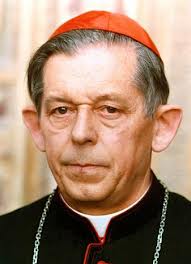
Current Primate of Poland Archbishop Jozef Kowalczyk said in his homily that Glemp had been faithful to the teaching of Pope John Paul II, encouraging people “to change the world through words and dialogue, and not by the sword and firearms.”
Main Article – Radio Polska, Jan.28th, 2013.
– –
“Jozef Glemp was born Dec. 18, 1929, in Inowroclaw, Poland. He decided early to be a priest, but his schooling was interrupted when the Nazis invaded in 1939. His father, a salt miner, joined the resistance, but Jozef, his mother, sister and two brothers became slave farm labourers. Ordained in 1956, Glemp was a parish priest and teacher before earning doctorates in civil and canon law in Rome. He returned to Poland in 1964 and was Wyszynski’s legal adviser for 12 years. He was Bishop of Warmia, a diocese of 1.3 million, from 1979 to 1981, when he succeeded Wyszynski on his death.
As he settled into his role as protector of the church in a national crisis, he asked Poles to pray instead of taking to the streets when martial law was imposed and Walesa was jailed…”
Main Article – The Globe and Mail Jan. 27th, 2013.
“Il suo nome è sinonimo di gesta gloriose”, titola “za Izobilie”, testata di Rossosch, dove il Corpo d’armata alpino aveva stabilito la sua sede. Alla presenza delle autorità locali e di molti giovani delle scuole è stato inaugurato il monumento al maresciallo delle truppe corazzate, Pavel Rybalko, due volte insignito del titolo onorifico di “eroe dell’Unione sovietica. 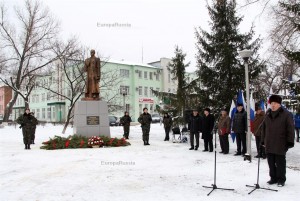
La Russia ricorda il 70esimo anniversario dell’operazione Ostrogov-Rossosch, che causò la ritirata dal fiume Don delle truppe dell’Asse durante la Seconda guerra mondiale. Tra qualche giorno, il 2 febbraio, sarà la volta della fine della battaglia di Stalingrado.
Cerimonie in occasione della “liberazione dal nazi-fascismo” si sono tenute un po’ ovunque in questo periodo nelle regioni di Rostov e di Voronezh. La maggiore in Italia è quella in calendario a Brescia.
“Abbiamo ricordato soprattutto le vittime di quelle terribili settimane – dice lo storico Alim Morozov, direttore del Museo del Medio Don, sito nell’asilo costruito dai volontari dell’Associazione nazionale alpini tra il 1992 ed il 1993 -. Oramai di veterani non ce ne sono quasi più”.
Un tempo in gennaio venivano in tanti dall’Italia per ripercorrere il triste cammino della ritirata. Chi a piedi, chi in autobus. “Quest’anno abbiamo visto soltanto un certo Alfredo della provincia di Brescia ed un piccolo gruppo portato da un’agenzia di turismo di Mosca”, racconta Morozov, che ha pubblicato recentemente due libri.
Il suo “Gli italiani a Rossosch 1942-43” è uscito in russo, ma la traduzione nella lingua di Dante verrà edita entro settembre 2013, quando oltre un migliaio di alpini con le loro famiglie sono attesi sul Medio Don per festeggiare insieme il ventesimo anniversario dell’edificazione dell’asilo.
L’Africa settentrionale rischia di trasformarsi in un nuovo Afghanistan? Oppure siamo di fronte ad un’ondata di colonialismo europeo sotto mentite spoglie, quelle del XXI secolo? Dopo la morte del leader libico Gheddafi l’Africa è diventata più insicura? “La crisi degli ostaggi in Algeria – chiarisce subito Aleksandr Tkachenko, vice direttore del Centro studi sull’Africa settentrionale dell’Accademia russa delle Scienze, – è certamente collegata con la guerra in Mali”. 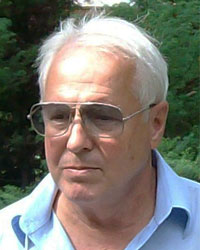
La situazione sul campo è assai complicata. “Da più di un anno in questa macroregione (Mali, Niger, Algeria e Paesi limitrofi) si osservano iniziative di forze separatiste, chiamiamole così, contro i governi centrali. Le motivazioni di carattere socio-economico, mi riferisco all’estrema indigenza in cui vive la popolazione, fanno da detonatore alla protesta. Non dimentichiamo che l’Africa è un continente povero”.
Da chi sono composte queste forze, come le ha chiamate lei, separatiste? “Vi è stata l’unione tra membri dell’opposizione anti-governativa, esponenti regionali, unità armate e gruppi vicini ad AlQaeda. Questa realtà, creatasi adesso, è una minaccia per tutti i Paesi dell’Africa occidentale”.
Perché quindi gli eventi algerini sono collegati con quelli del Mali? “Guardiamo alle richieste fatte dagli assalitori dei pozzi petroliferi. Primo, fermare l’intervento francese in Mali. Secondo, liberare alcune persone detenute a Guantanamo. Attenzione. Ricordiamoci la storia di Bin Laden. E cerchiamo di comprendere dove sia la frontiera tra protesta dell’opposizione ed estremismo e quando essa viene superata”.
Siamo pertanto di fronte ad un nuovo Afghanistan? “Non ora. Ma certi elementi lo fanno tornare in mente”.
Quale futuro per questa macroregione? “Le forze anti-governative potranno rafforzarsi nel lungo periodo. E’ un’area geografica difficile. Non sarà facile calmare le acque in fretta”.
Non è che gli occidentali stiano sfruttando la situazione per imporre un qualche nuovo tipo di colonialismo? “La questione è assai complessa e non si può riassumere in una battuta. Diciamo, invece, che nell’ultimo decennio le guerre civili in questa area del mondo sono di molto aumentate. Il rischio di un frazionamento del continente è palese. Pensiamo al Sud Sudan che si è separato dal Sudan. In precedenza è accaduta la stessa cosa tra Eritrea ed Etiopia. Nel Mali del Nord è stato appena proclamato dagli insorti un nuovo Stato. I governi centrali non riescono a risolvere i grandi problemi che attanagliano i loro deboli Paesi. La corruzione poi fa il resto. L’unica soluzione, in molti casi, è la separazione tra le regioni”.
Come è possibile che queste forze anti-governative siano armate fino ai denti? Queste armi provengono dalla Libia? “Tutti sanno che la Libia era un Paese ricco e ne aveva tante”.
Come mai questi gruppi sono così numerosi? “Gheddafi aveva al suo servizio tanti mercenari, originari dell’Africa nera. Adesso questi sono tornati a casa o in Paesi vicini e cercano di farsi una posizione con le armi in mano”.
Queste forze separatiste sono un pericolo per le rotte del petrolio e del gas? “Sì. Possono creare grattacapi in Algeria, tra i primi dieci produttori mondiali di materie prime, e provocare conseguenze negative internazionali”.
La Russia pare allineata su posizioni comuni all’Occidente. “Mosca cerca di fermare i conflitti con la diplomazia. All’Africa serve la stabilità”.
«Война это отрицание всего человеческого. Для народов она всегда трагедия, подслащенная высокими словами правительств о славе и героизме. Именно в эти дни семьдесят лет назад наши деды сражались друг против друга в решающей битве…
В наших альпийских деревнях, как и у вас в Воронежской и Ростовской областях, до сих пор вспоминают те страшные дни смерти и горя…
Давайте сейчас, с достаточной временной дистанции, зададим себе некоторые неудобные вопросы, помогающие прояснить хоть частичку исторической правды. Легко ли было обыкновенному человеку той эпохи сразу и бесповоротно определить, кто его настоящий враг? И было ли достаточно для этого только цвета мундира? 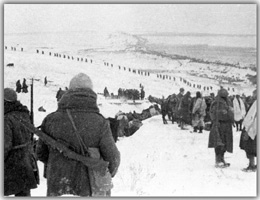
И в Советском Союзе, и в Италии Вторая мировая война была не только международной, но и гражданской… тут стоит быть очень осторожным. Говорить о некоторых вещах, наверное, и сейчас еще преждевременно…
Трудно представить, что будет в России, когда историки начнут профессионально заниматься наболевшими вопросами без привычных идеологических штампов…
Отношения итальянских военных с местным населением складывались своеобразно…
Краеведы-энтузиасты (такие, как Алим Морозов в Россоши, Евгений Писарев в Тамбове, Елена Стяжкина в Донецке) тщательно собирают первоисточники — настоящие свидетельства очевидцев в определенных местах. Их цель — воссоздать реальную картину событий военных лет. Но делать это совсем не просто. Они — одни против всех, против того, «что принято». Работают на Историю без какой-либо официальной помощи…
Я с восхищением наблюдал, как 81-летний Морозов, автор двух серьезных книг по этой тематике (одна только что вышла из печати), защищал в открытой дискуссии не свою точку зрения,…
В Россоши (Воронежская область) по инициативе Национальной ассоциации альпийцев Италии началась акция «Сорризо» («Улыбка»). В 1992–1993 годах альпийцами-добровольцами для россошанской детворы был построен замечательный детский сад. «Это народная дипломатия! Она более эффективная, чем официальная», — объяснил мне Морозов. Замечу: ни копейки не дало на это итальянское государство.
У входа в детский сад висит табличка: «Россошанским детям, не знающим горя и жестокости войны, альпийские стрелки Италии дарят этот сад для того, чтобы вспомнили о тех, кто на обоих фронтах пожертвовал собой во имя долга, и всем народам улыбнулось время свободы, дружбы и мира». … »
Статья – Джузеппе Д’Амато Московский Комсомолец № 26142 от 21 января 2013 г. Giuseppe D’Amato Moskovskij Komsomolets.
Слепая девочка Наташа Писаренко, учащаяся 10 класса из Ростова, написала открытое письмо президенту Путину. По официальной статистике, инвалиды в России составляют около 10% населения. Только во Всероссийском обществе слепых зарегистрировано более двухсот тысяч людей с частичной или полной потерей зрения.
* * *
Владимир Владимирович!
За последнее время Вы очень сильно изменились. К вам с возрастом пришла мудрость?
Вы вдруг узнаете о брошенных детях, вдруг узнаете, что этих детей усыновляют злодеи-американцы, и Вы быстро начинаете спасать детей от американского зла.
Теперь брошенных детей разберут российские приемные семьи? и мы ПОКАЖЕМ всему миру наше милосердие?
Но ваша мудрость не учла одного, что среди детдомовских детей есть дети-инвалиды, которые в силу тяжелых врожденных заболеваний живут очень мало, и в лучшем случае, дожив до двадцати лет, умирают.
Умирают потому, что в России нет современной медицины. Дети-калеки просто прикованы к детдомовским койкам и ждут … Раньше они ждали американцев, этих “злых” приемных родителей, а теперь они ждут наших, российских?
Владимир Владимирович, детей с тяжелыми врожденными заболеваниями не усыновят наши семьи, так как таким детям необходима современная медицина, которой в России нет.
Сильной, современной медицины в России нет.
Вот я вам и открыла государственную тайну, которую от вас скрывали, а я узнала о ней, еще, когда родилась слепой.
Точный диагноз и причину слепоты мне поставили немецкие медики, затем американские, выявили дефектный ген. И в скором времени судьба мне предоставит возможность обрести зрение. И это произойдет во враждебной Америке.
Для российских врачей я ребенок с непонятной этиологией заболевания и однозначно неизлечимой слепотой, а в Германии и Америке я пациентка, которой врачи стараются вернуть зрение.
Когда я родилась и меня привезли домой, папа сразу увидел, что я слепая. Ну а наши врачи увидели это только через три месяца.
Потом родители водили меня по врачам, и в Ростове, и в Москве. Но кроме денежного вознаграждения, которое необходимо платить наличными в карман врачам, ничего я не узнала о своей слепоте, а родители после таких походов вздыхали и вспоминали не добрым словом руководство страны.
Владимир Владимирович, а вот вам и еще одна государственная тайна: У российского государства нет денег на лечение детей.
Поэтому по радио, в Интернете только и слышишь, просят россиян пожертвовать деньги детям на операцию в Германию, США, Израиль. Требуются большие суммы, потому как лечить собираются тяжелые, врожденные заболевания у маленьких российских детей, чтобы после операции этот ребенок мог хоть в какой-то мере жить, чуть дольше, и жить немного полноценнее. А лечить то будут за рубежом.
Господин Президент! Удивите нас еще одной вашей мудрой выходкой – усыновите пять, десять брошенных детей с тяжелыми врожденными заболеваниями и мы последуем вашему примеру.
Наташа Писаренко.
Источник – LiveJournal – January 6th, 13:51
«Коста Конкордия», год cпустя после гибели.
12 Jan 2013 «Эта колонка не место для общественного процесса против капитана лайнера, главного подозреваемого в аварии, произошедшей в ночь с 13 на 14 января 2012 года недалеко от острова Джильо. Но все-таки у нас есть возможность уточнить здесь некоторые моменты…
Круизы в Европе пользуются заслуженной популярностью, они безопасны, удобны и по большому счету недороги. Наши круизные лайнеры на самом деле высшего качества — их, конечно, нельзя сравнивать с российской «Булгарией», как, помню, кто-то у вас написал… »
Статья – Джузеппе Д’Амато Московский Комсомолец № 26135 от 12 января 2013 г. Giuseppe D’Amato Moskovskij Komsomolets.
Due sono i favoriti della prima tornata elettorale: l’economista 68enne Milos Zeman ed il 62enne esperto in statistica Jan Fischer.
Con loro altri sette sono i candidati in lizza. Le previsioni della vigilia danno per scontato che nessuno riuscirà ad ottenere più del 50% dei voti per essere eletto già ora presidente. Si tornerà così alle urne il 25-26 gennaio prossimo per il ballottaggio. 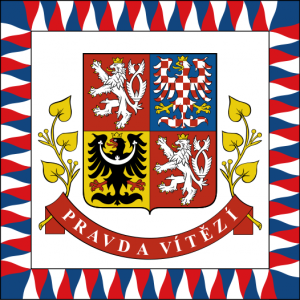
Dopo due capi dello Stato eletti dal Parlamento, Vaclav Havel e Vaclav Klaus, la Repubblica ceca ha deciso ora di cambiare sistema elettorale per evitare le passate contrapposizioni.
Sia Zeman che Fischer, ambedue ex premier, hanno posizioni più morbide con Bruxelles a differenza dell’euroscettico conservatore presidente uscente Klaus, il cui mandato scade il prossimo 7 marzo.
Il primo è tornato alla politica dopo anni di assenza, mentre il secondo si è segnalato per la buona conduzione del semestre di presidenza ceca dell’Unione europea.
Secondo la Costituzione in vigore il capo dello Stato ha il potere di scegliere il primo ministro sulla base delle elezioni legislative e di selezionare i membri della direzione della Banca centrale. Con l’approvazione della Camera alta del Parlamento il presidente nomina i giudici della Corte Costituzionale.
Ukraine has said it wants to strengthen human rights during its term – while facing criticism for its own democratic credentials.
Opposition leader Tymoshenko was sentenced to seven years imprisonment in a trial that drew wide international criticism. As a result, she was unable to take part in parliamentary elections in late October, which the OSCE observer mission declared to be unfair and a “step backwards.” 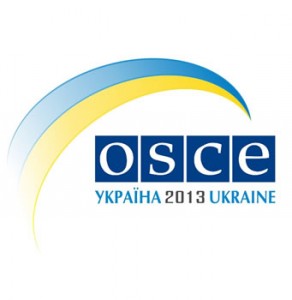
Susan Stewart at the Berlin-based German Institute for International and Security Affairs (SWP) also believes that Ukraine’s reputation has suffered in recent years because of human rights violations and backpedalling on democracy. “That’s why I think it will be difficult for Ukraine to exercise strong leadership,” Stewart said.
Ukraine is the second former Soviet republic to assume the OSCE presidency after Kazakhstan in 2010, which paved the way. But Kazakhstan was also criticized for human rights violations.
The OSCE was created during the Cold War to serve as a forum for dialogue between the warring blocs in the East and West. Today, the Vienna-based organization unites 57 nations from Europe, Central Asia and North America. It fights terrorism, seeks to resolve conflicts and helps protect the environment. Observing human rights and fundamental freedoms is a key part of OSCE’s security concept.
Old divisions threaten to paralyze its work.
Complete Article – Roman Goncharenko – Deutsche Welle
OSCE-Ukraine
Ukraine’s representative at the negotiations on the Transdniestrian conflict settlement, Ihor Kharchenko has said that the Transdniestrian conflict settlement will be the No. 1 priority during Ukraine’s presidency of the OSCE in 2013.
Welcome
We are a group of long experienced European journalists and intellectuals interested in international politics and culture. We would like to exchange our opinion on new Europe and Russia.
Categories
- Breaking News (11)
- CIS (129)
- Climate (2)
- Energy&Economy (115)
- EU Eastern Dimension (85)
- Euro 2012 – Sochi 2014 – World Cup 2018, Sport (43)
- Euro-Integration (135)
- History Culture (198)
- International Policy (261)
- Military (74)
- Interviews (18)
- Italy – Italia – Suisse (47)
- Odd Enough (10)
- Poland and Baltic States (126)
- Religion (31)
- Russia (421)
- Survey (4)
- Turning points (4)
- Ukraine (176)
- Российские страницы (113)
Archives
- November 2020
- October 2020
- September 2020
- August 2020
- July 2020
- May 2020
- April 2020
- March 2020
- January 2020
- December 2019
- November 2019
- October 2019
- September 2019
- August 2019
- July 2019
- June 2019
- May 2019
- April 2019
- March 2019
- February 2019
- December 2018
- November 2018
- October 2018
- September 2018
- August 2018
- July 2018
- June 2018
- May 2018
- April 2018
- March 2018
- February 2018
- January 2018
- December 2017
- November 2017
- October 2017
- September 2017
- August 2017
- July 2017
- May 2017
- March 2017
- January 2017
- December 2016
- November 2016
- October 2016
- September 2016
- July 2016
- June 2016
- May 2016
- April 2016
- February 2016
- January 2016
- November 2015
- October 2015
- September 2015
- June 2015
- April 2015
- March 2015
- February 2015
- January 2015
- December 2014
- November 2014
- October 2014
- September 2014
- August 2014
- July 2014
- June 2014
- May 2014
- April 2014
- March 2014
- February 2014
- January 2014
- December 2013
- November 2013
- October 2013
- September 2013
- August 2013
- July 2013
- June 2013
- May 2013
- April 2013
- March 2013
- February 2013
- January 2013
- December 2012
- November 2012
- October 2012
- September 2012
- August 2012
- July 2012
- June 2012
- May 2012
- April 2012
- March 2012
- February 2012
- January 2012
- December 2011
- November 2011
- October 2011
- September 2011
- August 2011
- July 2011
- June 2011
- May 2011
- April 2011
- March 2011
- February 2011
- January 2011
- December 2010
- November 2010
- October 2010
- September 2010
- August 2010
- July 2010
- June 2010
- May 2010
- April 2010
- March 2010
- February 2010
- January 2010
- December 2009
- November 2009
- October 2009
- September 2009
- August 2009
Our books





